I conquered Empire of Sin’s Chicago as Al Capone
Being a gangster is a tough business.
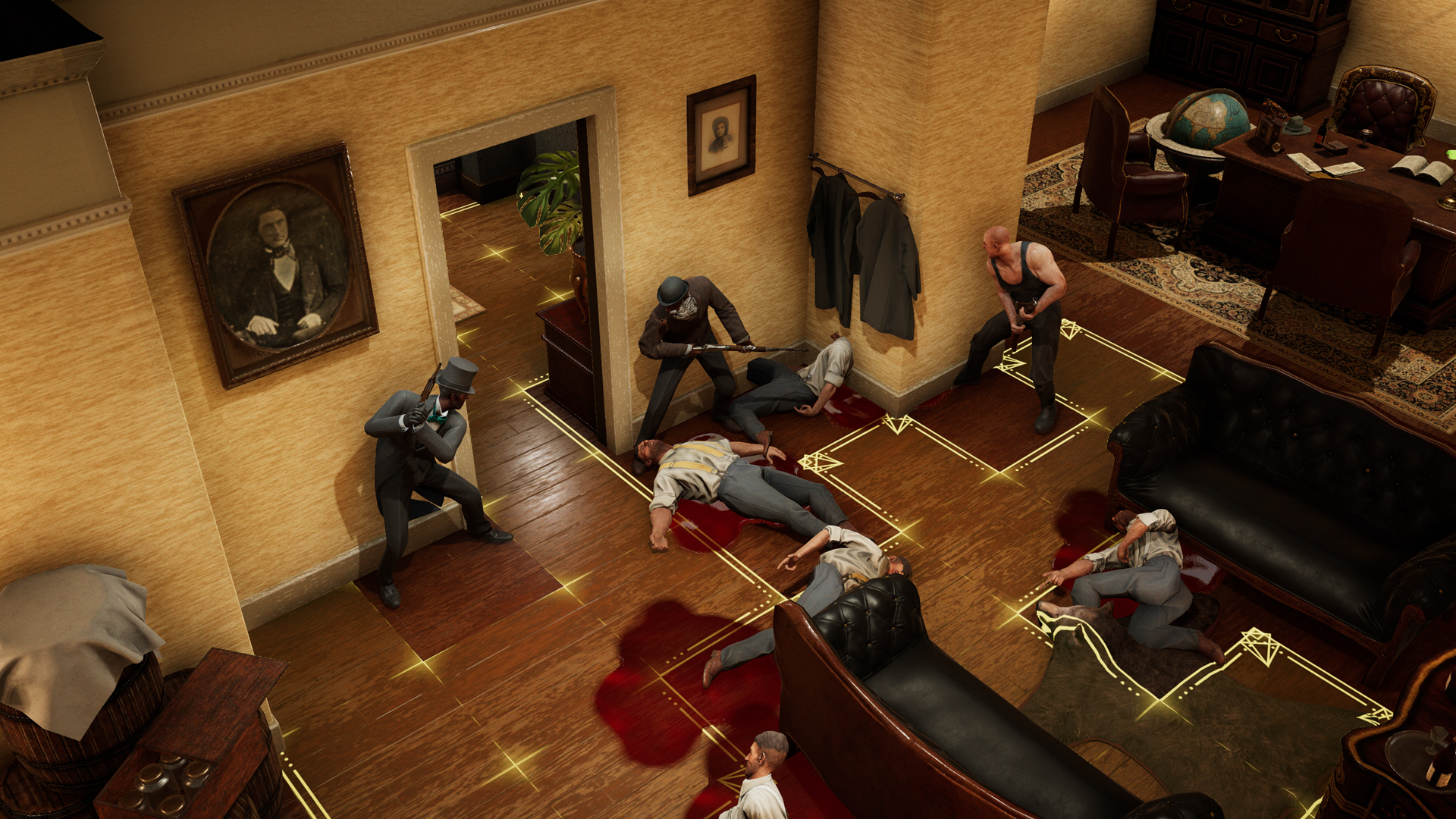
It’s not an easy job, working for a prohibition-era Chicago mob boss. Empire of Sin lets you recruit and nurture a gang drawn from a pool of 60 crooks, all eager to make a name for themselves—and a buck or two—in the criminal underworld, but I suspect they would have had second thoughts if they’d known what was in store for them when I slipped into the shoes of the infamous Al Capone.
Capone’s one of 14 playable mob bosses, some invented, some historical, and some even related to members of the team—like Elvira, a 70-year- old brothel owner based on John Romero’s great- grandmother. It’s a cast with a lot of big characters, and it features a level of diversity that you don’t usually see in prohibition- inspired fiction, though it’s one that’s actually more true to life.
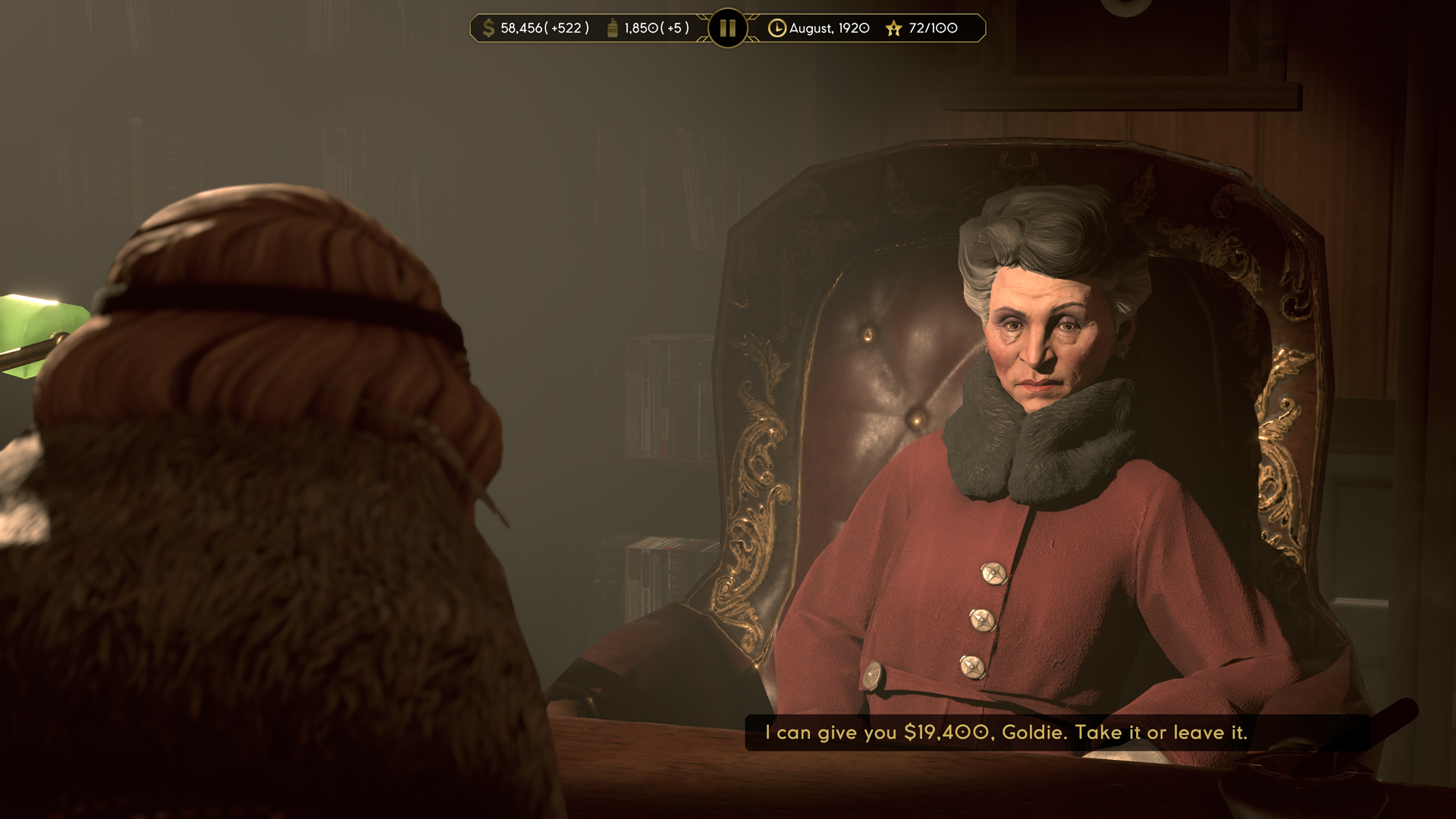
"I do think it was a significant design challenge," says game director Brenda Romero, who also has a family connection to one of the bosses. "Like, hey, we would like to have a 70-year-old woman as a boss. You know what? Why the fuck not? And it’s especially important, as it’s a nod to John’s heritage. His grandmother and great-grandmother before that were the absolute matriarchs of the family. But that’s a challenge because this is a combat game and you’re pretty hardcore."
Despite her age, Elvira can handle herself pretty well, and she needs to, as bosses play a big role in gang warfare thanks to their unique abilities. She can use drugs to control minds, for instance, while Capone can spray a sizeable area with lead, suppressing and damaging anyone trying to move. Equally as impressive is his ability to keep sucking on that cigar even while he’s beating a man to death in the park with a crowbar.
Having already played some of the early game last year, I was dropped into a later save with several rackets up and running and a bunch of gangsters ready to do my bidding. I had cash, I had booze and the future was looking bright for Al Capone. Ten minutes later, two of my gangsters were riddled with bullets and in critical condition.
Though it’s a strategy game, Empire of Sin dips into RPG territory frequently. There are classes, talent trees, special traits, colour-coded loot, and plenty of missions and side quests. As my gang sauntered down the streets of Chicago, which can be pored over from the strategic world map view or explored close-up, we encountered a bloke with a missing wallet, and a few seconds later we were in combat with the thugs who’d pinched it.
A close quarters scrap in a filthy alley is not an elegant thing, especially when there are six people fighting and only one dumpster that can be used for cover. Everything is real-time with pause until combat begins, at which point it becomes turn-based and more evocative of XCOM. It’s all cover and hit percentages and praying to the fickle gods of RNG. This time, they were ambivalent, letting us get through it alive but with some bad injuries. I’d only just started, but half of my gang was going to be out of commission for a whole year.
Keep up to date with the most important stories and the best deals, as picked by the PC Gamer team.
The severity of the combat is a more recent addition. At the end of fights, gangsters used to immediately get all of their health back, but now they’re at risk even when they’re not in critical condition, as health takes a lot longer to regenerate. It pays to employ some doctors in your gang, then, and they’re just as capable in a scrap as any other goon on the mean streets.
"Originally, we wanted to reduce the amount of minding the player had to do with the crew," principal combat designer Ian O’Neill explains. "But it also reduced the strategic choices that the player had to make after combat." Med packs, doctors and a trip back to the safe house will get your gangsters back in tip-top shape, but the risk is heightened just enough so that the outcome of a battle isn’t as simple as winning or losing—you can definitely have pyrrhic victories.
Criminal past
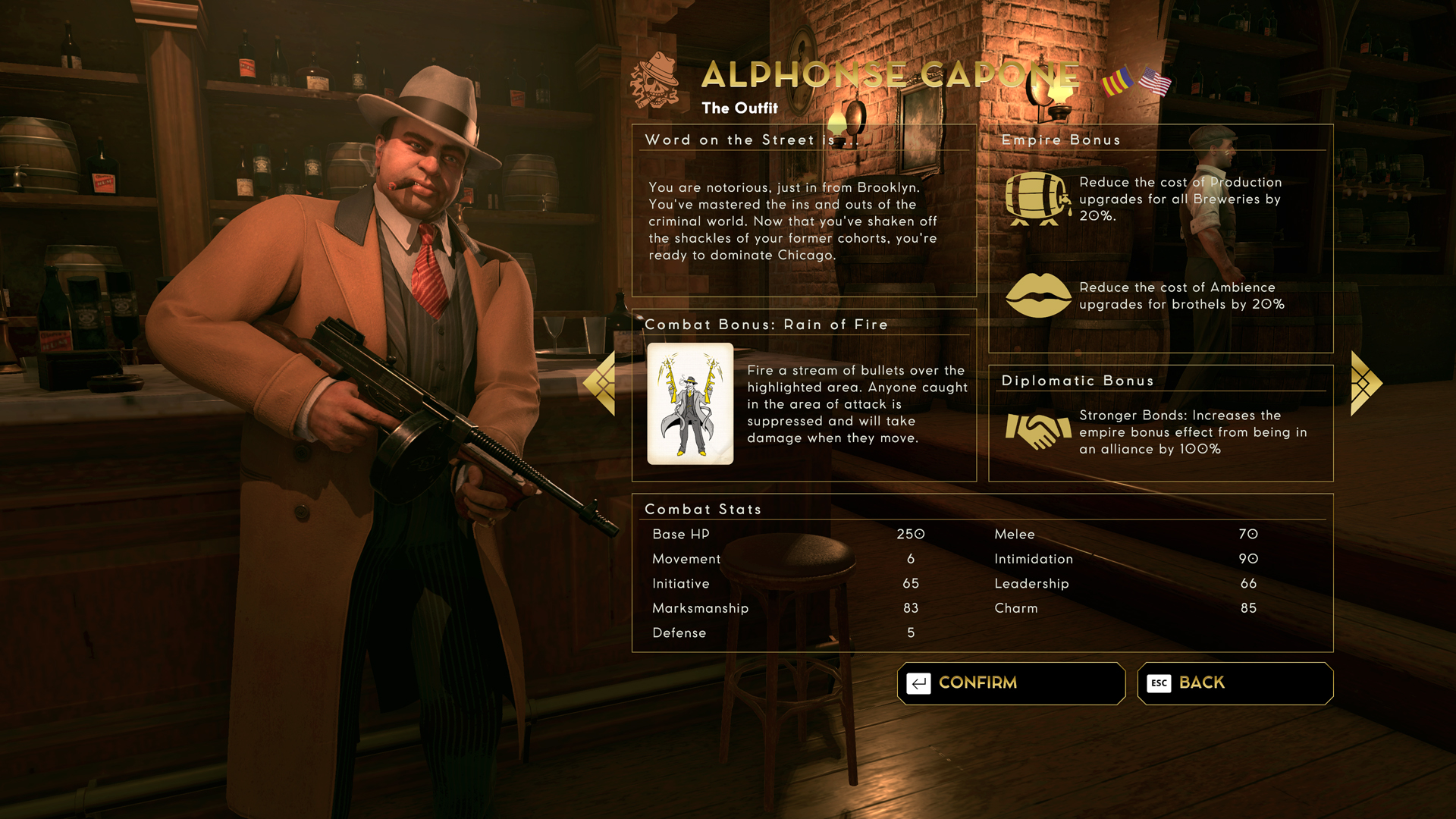
So while the random diversions where you lend someone a hand or get into an impromptu fight seem inconsequential, they can still leave a mark. Maybe you’ll end up having to deal with the cops or, like me, lose some key members of your gang. Then there’s the more story-driven missions—stuff connected to specific bosses and characters. You could think of them like companion and personal quests to get involved in.
See, everyone’s got a story in Empire of Sin. Relationships and traits develop over time, but characters will still start out with backgrounds and features that suggest they had a life before they suddenly turned up for work one day. They might have lovers, enemies or a pocket full of grenades, and through their missions their past can sometimes catch up with them.
"It tells you a bit about their character, their history and motivations," says lead writer Katie Gardner. "For the historical bosses, we tried to use their actual history—what they did in real life. Like Daniel McKee Jackson had a real relationship with the mayor of Chicago, Bill Thompson, so we tried to use their relationship in his boss mission. And we always try to give choices as often as we can in these missions, so players have a lot of agency in how the mission goes."
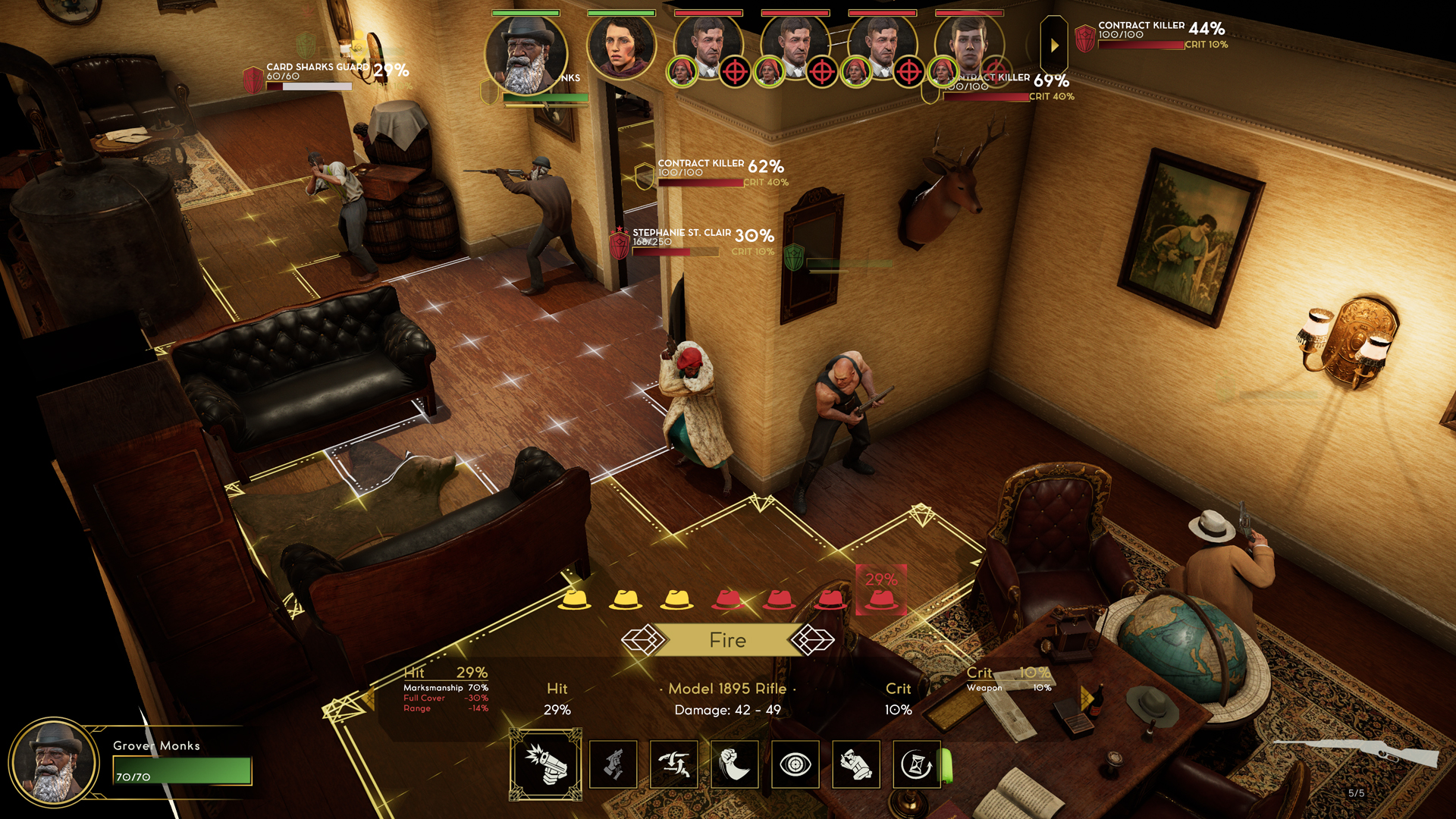
Maria, one of the first gangsters you’ll probably meet, quickly embroiled me in her dramatic life. There was her partner, Bruno, whom I had to hunt down when he disappeared, only to find him in a drunken stupor in another alley, necessitating another fight with some nearby thugs. Then there was a mysterious man from her past who had wronged her. She wanted me to kill him, and he was even willing to accept his fate, though he promised he was a changed man. I could have opted for mercy, but my trusty crowbar was thirsty.
With two gangsters down, I needed to recruit more bodies to protect me from bullets, but I’d already spent a chunk of cash. If I wanted more, I was going to have to improve my rackets. Businesses can be upgraded for a fee, beefing up their security or making them produce more profitable. If they’re a bit on the quiet side, you can even do some marketing, spreading the word, on the low down, about your services. Then you can tailor them to the neighbourhoods they reside in, for example stocking the shelves of a speakeasy with high-end booze if it’s in a prosperous area. You’ve got to match tastes and wallets.
Bloody business
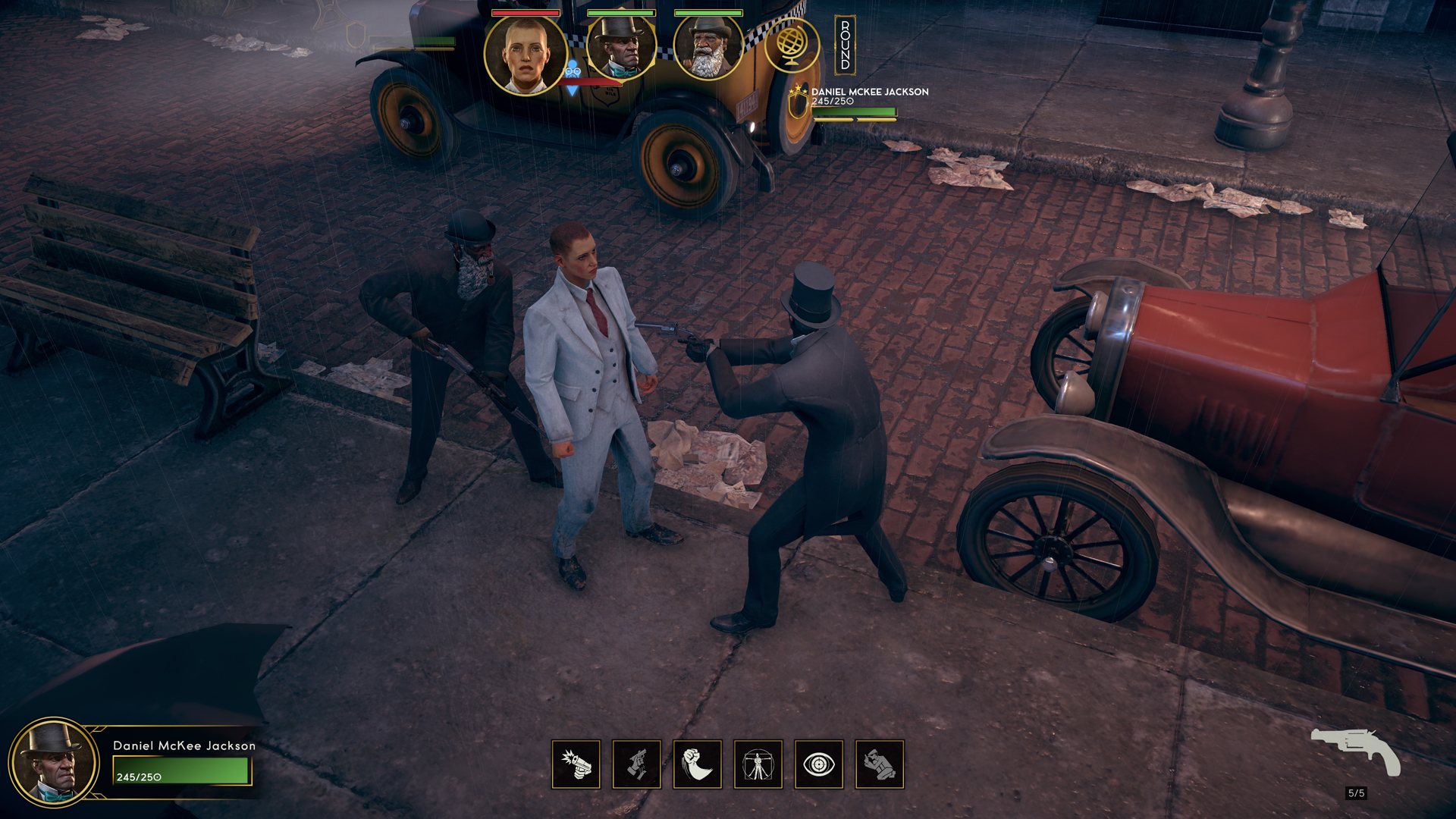
Chicago is split into up to ten different neighbourhoods, and each has a slightly different character. One might give a bonus to casinos operating in the area, while another might be quiet because its residents live in fear of mob violence. The character of a neighbourhood can also be influenced, letting mob bosses develop red light districts, boozy havens, or sow terror.
"If you start going on a killing spree, killing thugs, killing cops, executing people, that will actually depress the prosperity of a neighbourhood and lead to people staying at home," senior game designer Chris King tells me. "But you can then use it as a tactic to depress the prosperity of neighbourhoods where you don’t have a lot of rackets and actually depress the income of other gangs."
I had businesses going in two neighbourhoods, but my focus was on the Little Italy region, where I was competing with three other major gangs and several minor ones. There were still businesses I could swallow up if I wanted, but it was definitely starting to get a bit crowded. I’d been keeping the peace while trying to earn some more cash, even agreeing to an uneasy alliance with one of them, but I was itching to get into a fight.
An opportunity arrived in the form of the Canadian Maple Association, a group of bootleggers who smuggle booze from across the border. They had a deal with my new ally, but it wasn’t working out. They wanted me to take their place on their latest delivery, and sabotage the distillery. I agreed, of course. I was able to walk right in and shamelessly poison the booze right in front of the workers. With the job done, my new friends promised lots of future work. My old friends however... well let’s say they were less than impressed.
Face off
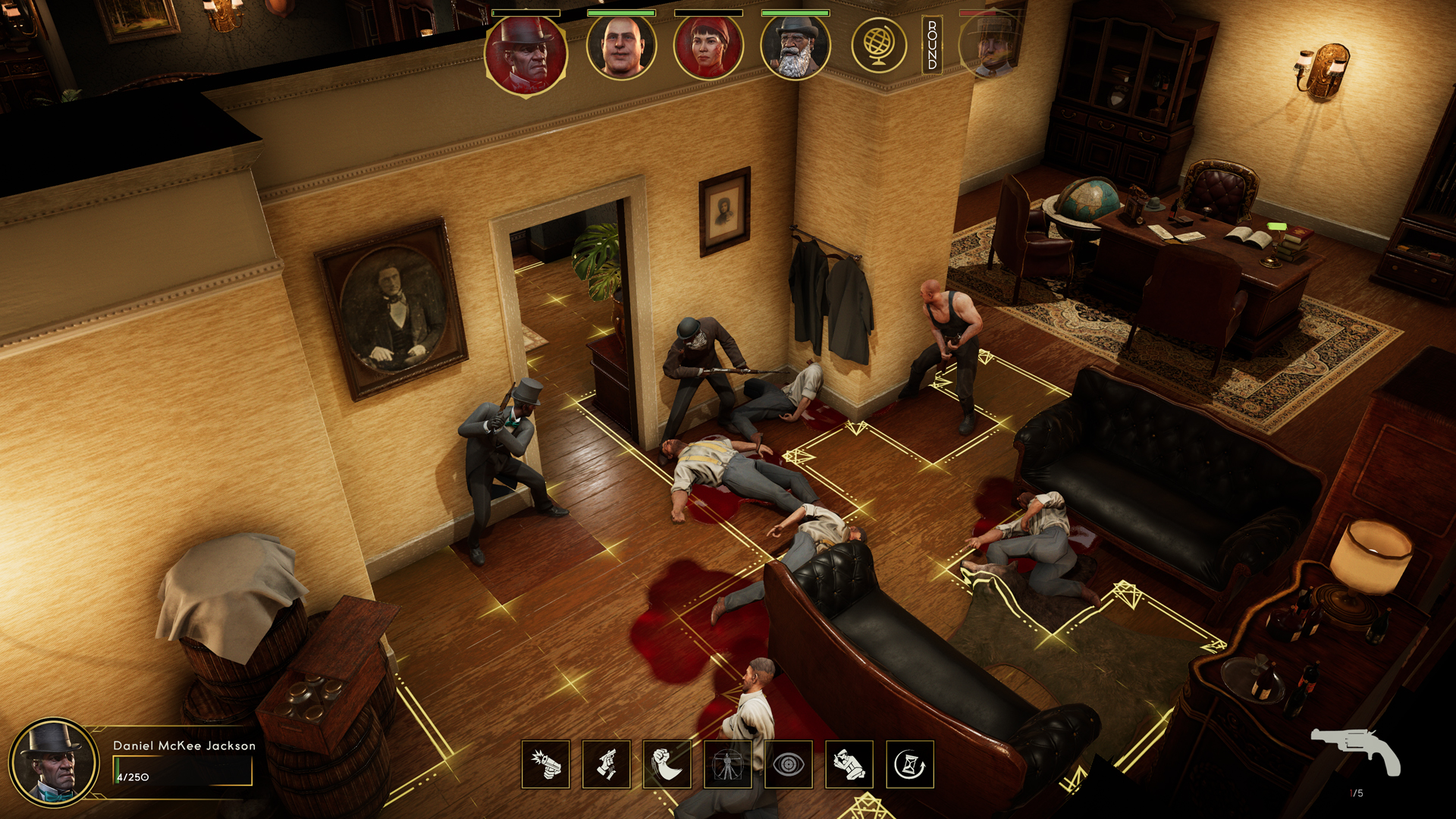
Diplomacy between major gangs works in two ways. There’s the regular diplomacy options that you get when dealing with all types of gangs, letting you trade, discuss deals, beg for cash, and declare war, and then there are the face-to-face sit-downs. It’s an opportunity to bury hatchets, rile enemies up, or indulge in a new collaboration. Or you can just walk in and brazenly admit you sabotaged their distillery before telling your rival gang to go fuck themselves.
"What I love about this is that it gives the player the ability to have a degree of mastery over these characters if you get to know them," explains Romero. "The way that the AI works, it is trying to think like they would think. If you’re a greedy son of a bitch, this is what you might do. If you’re pretty hardcore, you might do something else. And Daniel McKee Jackson was known for being incredibly disciplined and principled. So you can start thinking, well, if I were that way, how might I handle that situation?"
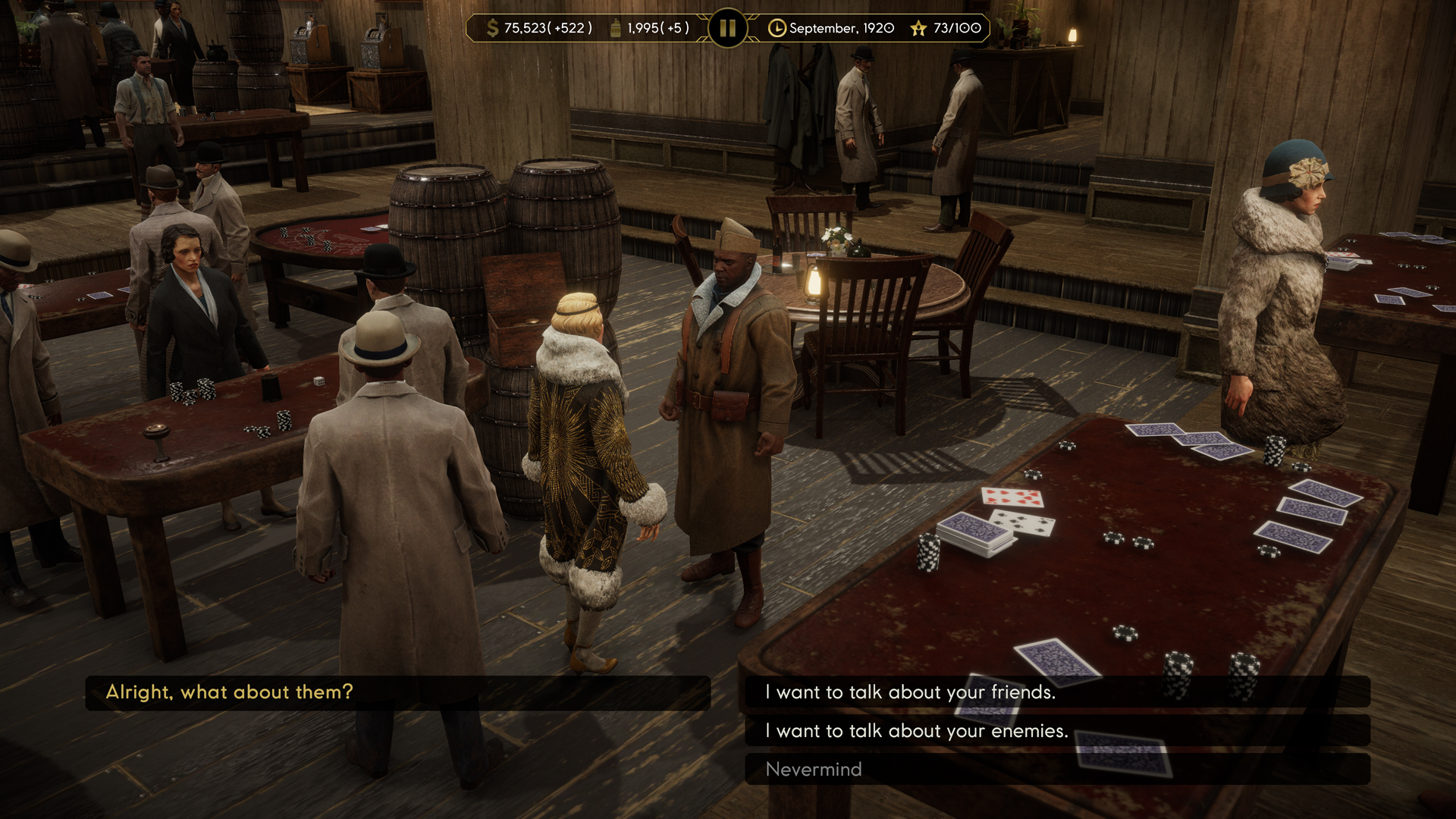
I was at war with my former ally. I hadn’t really prepared, so I quickly recruited some of that muscle I’d been meaning to hire. I found a burly bloke named Gibby—a demolitionist and the owner of the aforementioned pocketful of grenades. Once he arrived, I went straight for the throat. You can chip away at other gangs by taking over their businesses, but you can also head straight for their safe house and kill the boss, inheriting everything in one fell swoop. That’s risky, though, because bosses surround themselves with tougher gangsters and, thanks to their unique combat abilities, put up a better fight.
We stormed the hideout and, despite fewer numbers and a crappy starting location, we got to work clearing the building out very quickly, largely thanks to Gibby and his penchant for blowing stuff up. Unfortunately, the enemy boss had hired one of Gibby’s pals, and Gibby didn’t take it very well when his mate was blown sky high. It was really his fault, since it was his grenade, but he took it out on me. He quit the gang, right there and then, and walked straight out the door. He didn’t even give me two weeks’ notice.
Thankfully, we still managed to win the fight, immediately netting me lots of businesses, cash and loot, none of which Gibby would benefit from. He made a big mistake, but being a generous boss I’d eventually rehire him. I shared his love of big explosions and I missed him. Mechanically, however, we didn’t have any sort of relationship. While Empire of Sin’s gangsters are all part of a network of friendships and beefs, the bosses are above it all.
Keep it professional
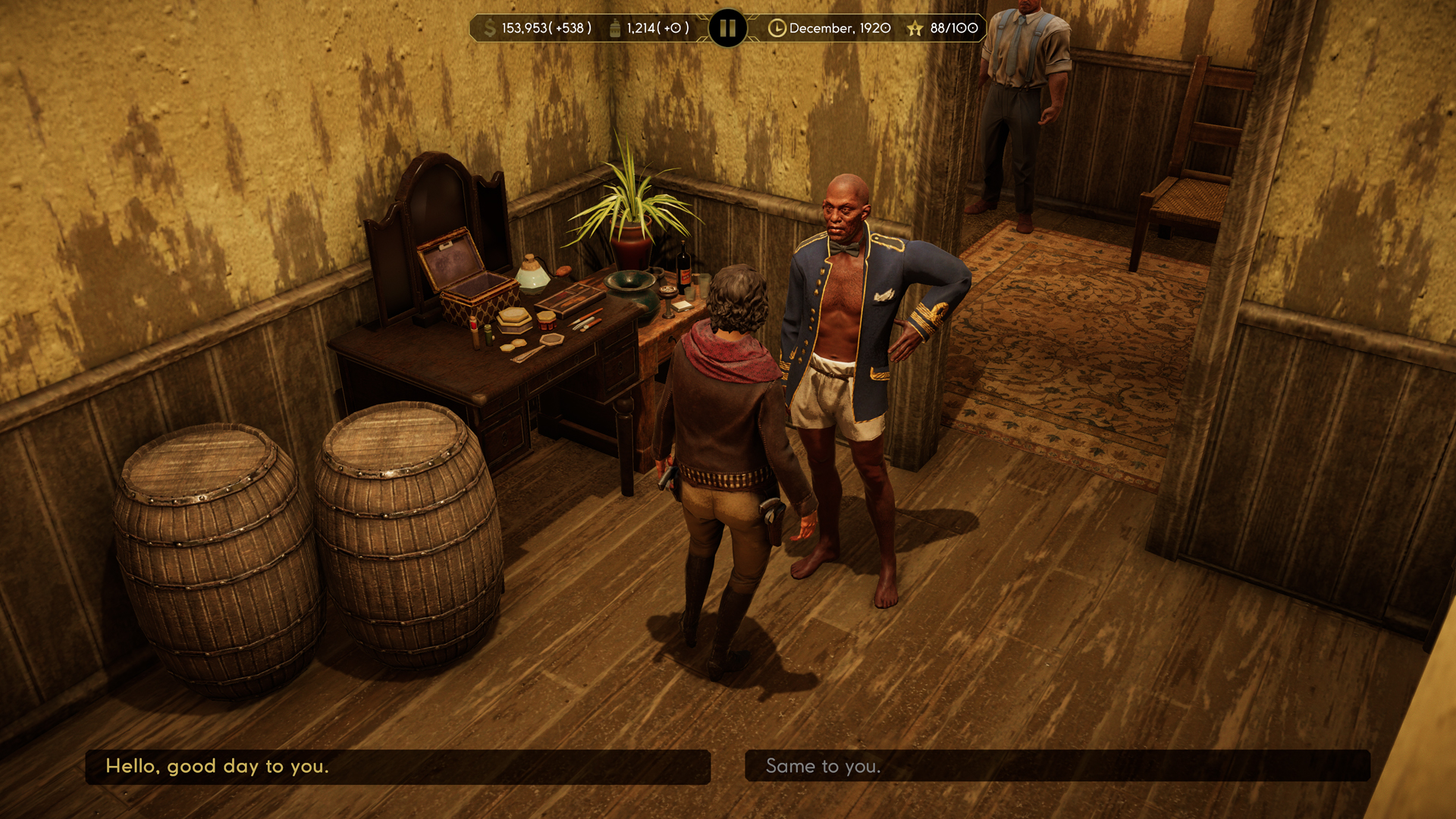
"I think it’s just that, as you’re the mob boss, we don’t actually want to say you like this gangster, dislike this one and are in love with that gangster," says King. "That’s more something you can decide, who you like and who you dislike, rather than have the game tell you these are your friends."
You’re the puppet master, pulling on everyone’s strings rather than getting tangled up in them. But only if that’s how you want to play it. You can still choose to favour specific members of your gang, giving them more responsibilities by making them the capo of one of your neighbourhoods, but you won’t be able to start taking them out on romantic excursions—not unless your grand idea of romance is a corpse-filled casino.
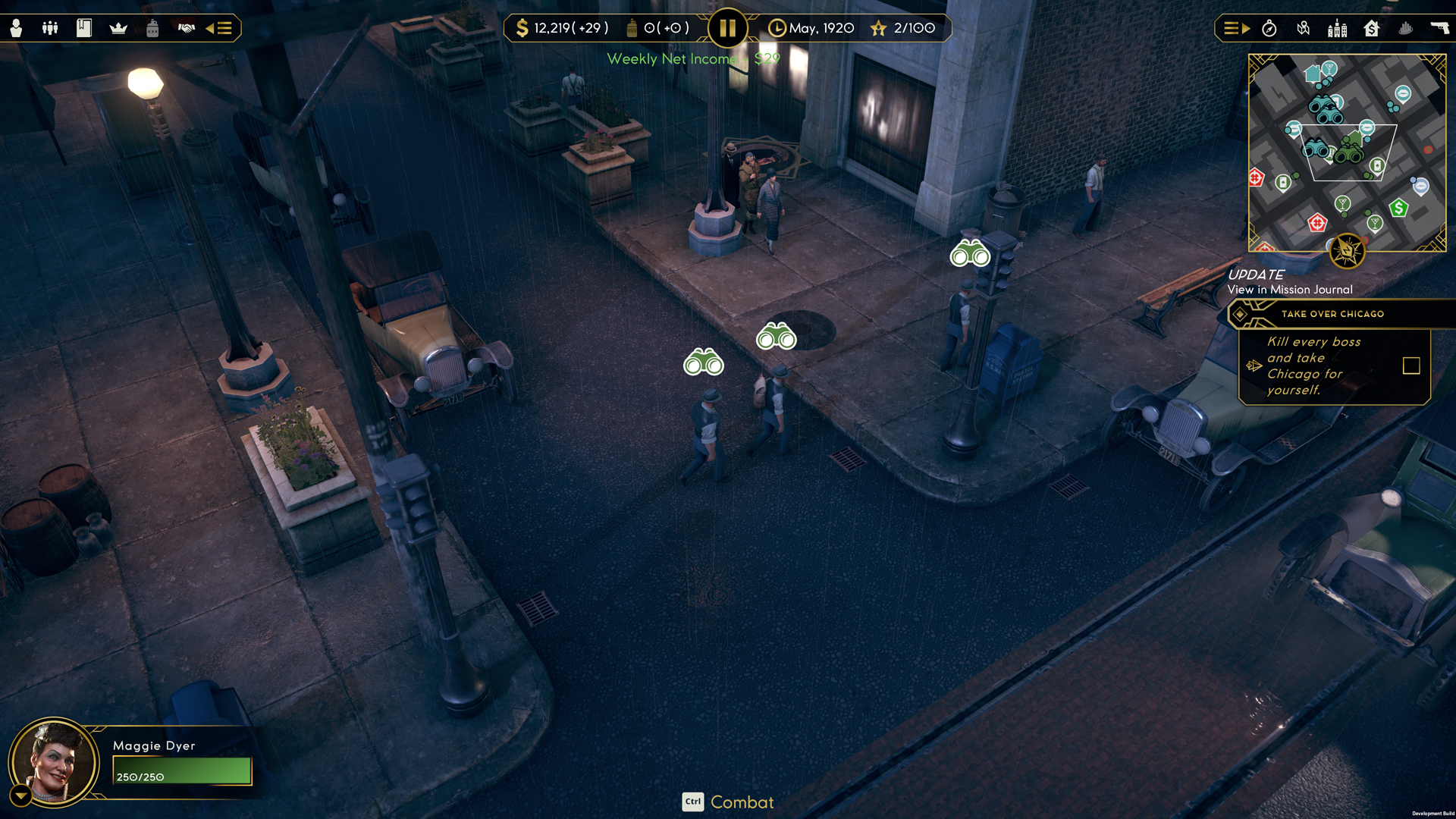
My betrayal paid off and I gained total control of the neighbourhood, which happens when you own the majority of its rackets. Conveniently, you don’t need to take over every single one of them and completely run the other gangs out of the area, you just need to be the top dog. I had a taste for it, however, so I started crushing all the minor gangs and strengthening my grip over the area. Before long I had two neighbourhoods largely under my control, as well as a few new enemies.
All this conquest was taking its toll on my employees. Gibby, newly returned to the fold, almost died in a speakeasy fight, the guy I’d hired to be our surgeon had become a bloodthirsty psychopath, and three of them got an STD all in the same day. Gangsters can get traits from combat, but they can also get them by just hanging out in brothels for too long. Some negative traits, like the STDs, can be cured, while others are just part of their history. Now, I’m not going to judge what anyone does when they’re off the clock, but brothel shenanigans while on the job crosses the line. I’d sent them to take over the place, not use its services. Then there was their loyalty to worry about. Members of your gang can even start working for your enemies, and you’ll have to rely on the rest of your crew to root out traitors.
Whack a mole
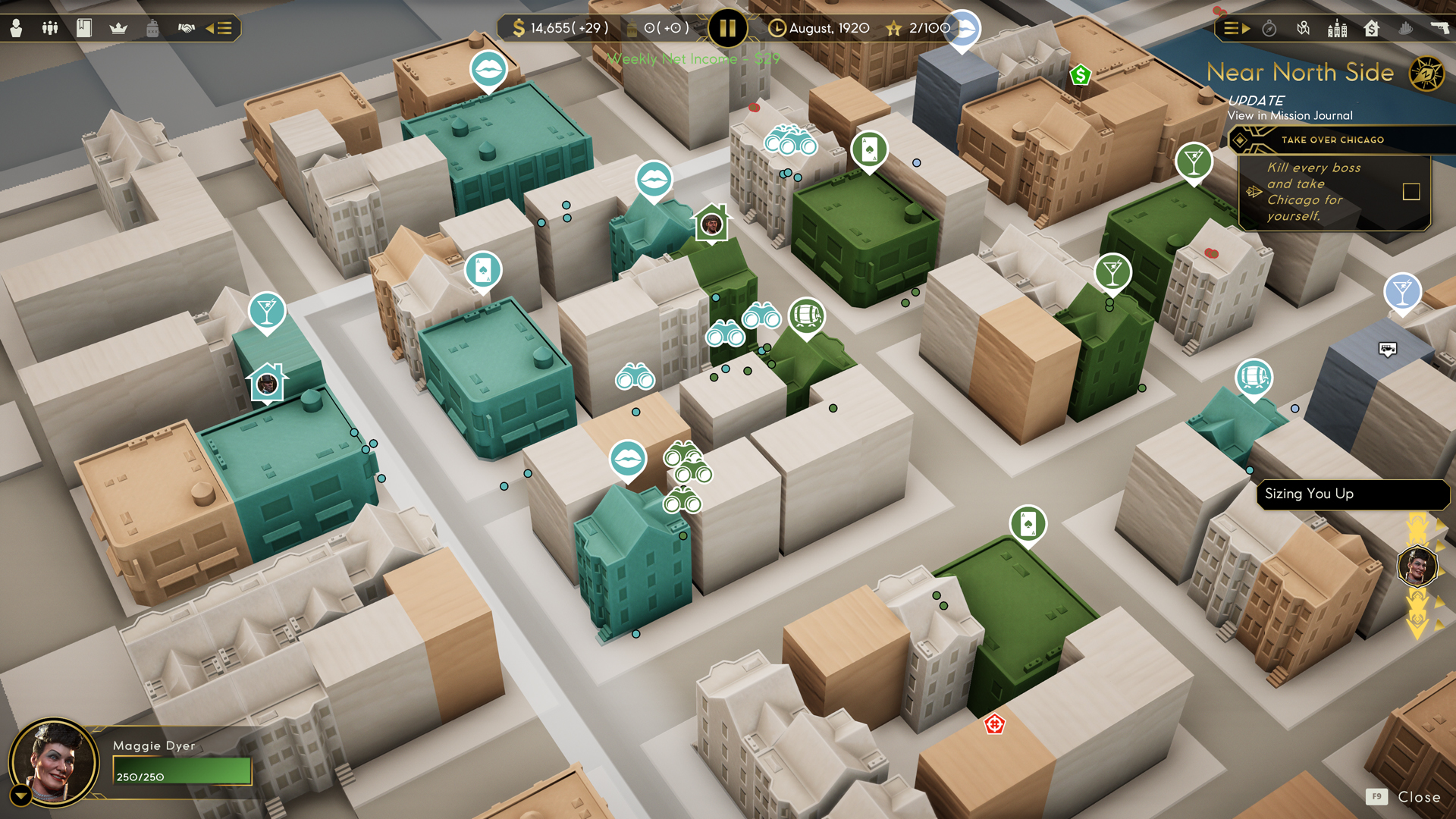
"There are no grey areas in gang life, now or 1920," says Romero. "When a gangster thinks that there might be a mole in your crew, you’re put in a situation where they all point the finger at somebody. They’re giving you their best guess, but they might be wrong. It could be that you decide ‘Yep, I agree with you guys and that’s the person’ and off somebody. If you’re wrong, there will be consequences to that. If you’re right, you stop the free flow of information from your group."
Thankfully, they were all still well enough and loyal enough to help me pinch another distillery—my patrons were getting thirsty—from another former ally whom I betrayed. I’m awful and nobody should trust me. You can attack a gang before you’re formally at war, so we just walked through the front door, got into a favourable position and then let loose. Even when you’re dealing with already hostile gangs or groups of unaffiliated thugs roving the streets, there are opportunities to get the drop on them and set your gangsters up in real-time before the turn-based combat kicks off.
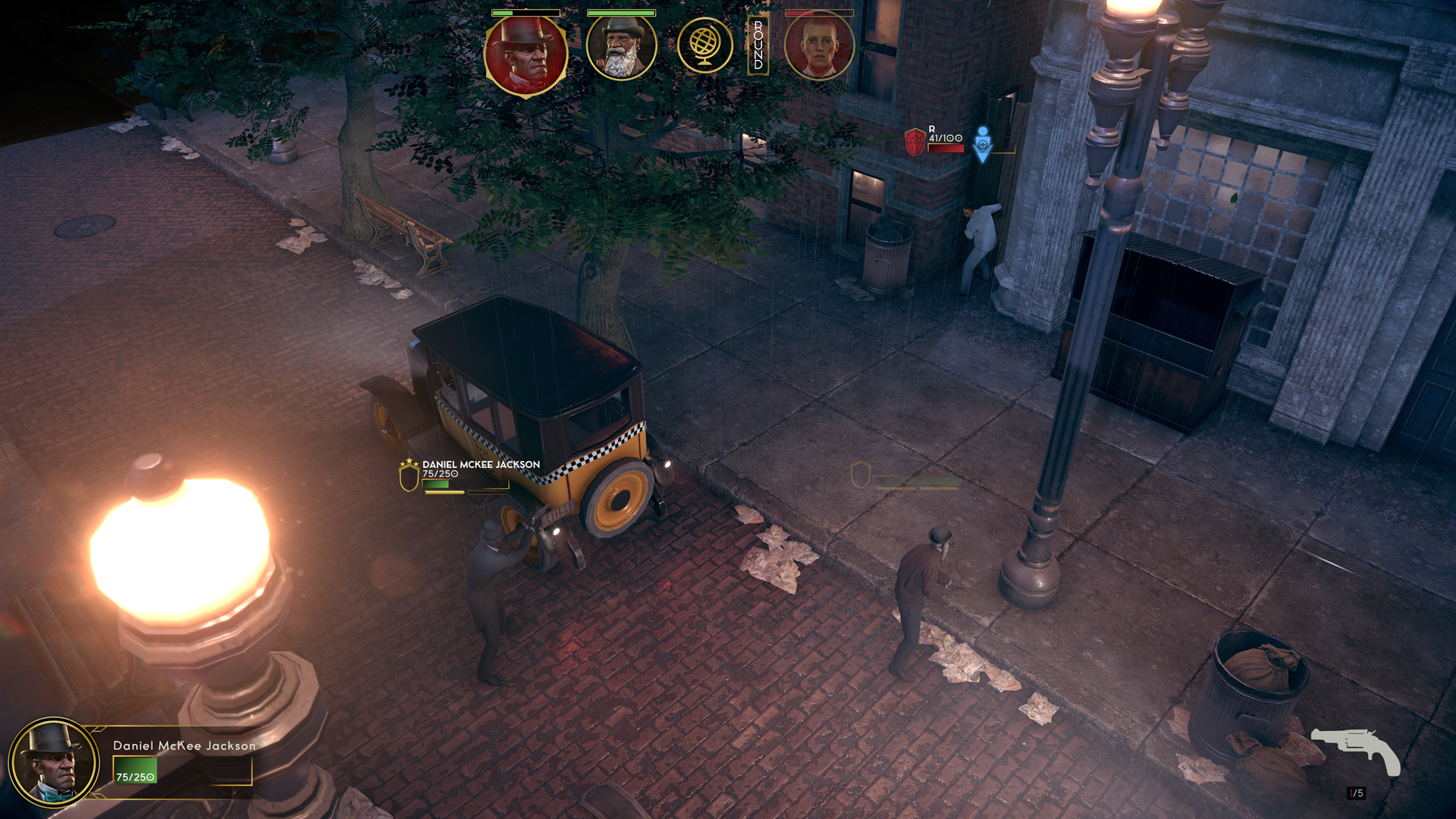
What was unexpected was the invitation for a sit-down, rather than an immediate declaration of war. My fellow boss wanted to talk. Maybe I could have given him back the distillery and smoothed things over, but that didn’t seem like a very Al Capone thing to do. Instead I added insult to injury, goading him into all-out war. I had big plans for the rest of his rackets.
Those plans unfortunately never came to fruition, as my time was up. None of my employees actually died, so maybe I’m not such a bad boss after all. Running a gang is still a tricky business, though. It’s not challenging in the conventional sense, perhaps, though battles can turn bad pretty quickly, but there are a lot of things vying for your attention, and focusing too much on one can have a detrimental effect on other parts of your criminal empire. The variety on offer is also a massive hook, however, and it looks like Romero Games has managed to squeeze a lot into Empire of Sin.

Fraser is the UK online editor and has actually met The Internet in person. With over a decade of experience, he's been around the block a few times, serving as a freelancer, news editor and prolific reviewer. Strategy games have been a 30-year-long obsession, from tiny RTSs to sprawling political sims, and he never turns down the chance to rave about Total War or Crusader Kings. He's also been known to set up shop in the latest MMO and likes to wind down with an endlessly deep, systemic RPG. These days, when he's not editing, he can usually be found writing features that are 1,000 words too long or talking about his dog.

